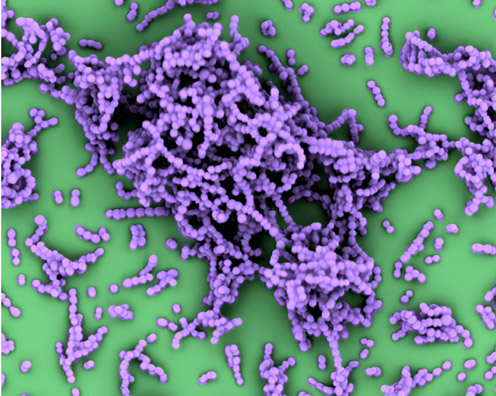Microbiome and Microbial Sciences
BMS Faculty in Microbiome and Microbial Sciences
Research Area Leaders: Rob Knight and Victor Nizet
The Microbiome & Microbial Science Research Area focuses on the numerous critical interactions of humans with the microbial world, in both health and disease. The diverse and cross-disciplinary faculty members of this research area apply fundamental principles of microbiology, immunology, molecular cell biology, pharmacology, -OMICs (genomics, proteomics, metabolomics) and systems biology to understand the composition and function of the human microbiome, and to elucidate the molecular and cellular pathogenesis of viral, bacterial fungal and parasitic infectious diseases.
The microbes that normally inhibit our gut, skin and mouth provide the vast majority of our body’s gene content, and function to help us digest and process nutrients, while generating their own waste and metabolites. Importantly, these microbes constantly interact with, and help shape, our immune systems. It is now recognized that the makeup of our microbiome influences diverse diseases including food allergies, obesity, inflammatory bowel disease, colon cancer, rheumatoid arthritis, atherosclerosis, asthma and even the brain function and behavior. Microbial communities we encounter in the home, hospital and outdoor environments further influence our health status. Understanding our microbiome and its role in human health can inspire novel diagnostic, preventative and therapeutic interventions. Indeed, the rich chemical and metabolic diversity of the microbiome is itself a promising source for new drug discovery.
Infectious diseases caused by bacteria, viruses, fungi and other parasites remain major causes of death, disability, and social and economic disruption. Infections are most prevalent in developing countries and among the poorest people, with limited or no access to integrated health care, prevention tools and medications. Ongoing threats include HIV/AIDS, malaria and neglected tropical diseases, and pandemic influenza and coronavirus disease. Increasing pathogen resistance to antibiotics (e.g. MRSA, multi-resistant tuberculosis, C. difficile) poses a critical threat to modern medicine as we know it. Research in the track seeks innovative infectious disease therapies to counteract this threat, through high-throughput screening, chemical genomics, and innovative strategies such as virulence factor inhibition, immune boosting, designer vaccines, probiotics and bacteriophage.
Faculty members in the Microbiome and Microbial Sciences research area are located not only in Departments throughout UC San Diego School of Medicine and Skaggs School of Pharmacy & Pharmaceutical Sciences, but also across the broader UC San Diego Campus including Biological Sciences, Chemistry & Biochemistry, Bioengineering, and the Scripps Institution of Oceanography. The training area is part of a campus-wide initiative of the same name, and works in close collaboration with the UC San Diego Center for Microbiome Innovation, the joint UC San Diego/La Jolla Institute of Allergy & Immunology Program in Immunology, and the upcoming Collaborative to Halt Antibiotic-Resistant Microbes (CHARM).

BMS provides a unified core curriculum for all first-year students. Based on their interests, students can choose from a range of elective courses to fill their 15-unit elective requirement. Courses related to this research area are listed below.
| Quarter | Course Number | Course Title | Units |
|---|---|---|---|
| Winter | BGGN 238A | Integrative Microbiology I | |
| Spring | BGGN 238B | Integrative Microbiology II | |
| Winter | BGGN 225 | Graduate Immunology | |
| Spring | BGGN 226 | Graduate Virology | |
| Spring | BGGN 264 | Structural Biology of Viruses |